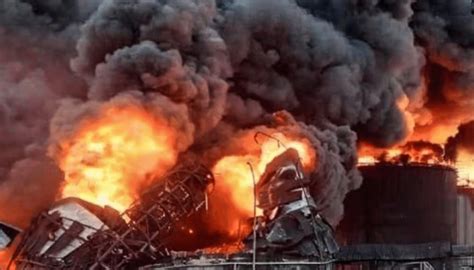
Ukraine is facing accusations from Russian President Vladimir Putin, who has blamed Kyiv for what he described as a “terrorist act” targeting a railway in the Bryansk region of Russia, an incident that has further complicated already stalled peace negotiations between the two countries.
President Vladimir Putin has accused Ukraine of carrying out a “terrorist act” after a train was derailed in Russia’s Bryansk region, an incident that occurred amidst already strained relations and stalled peace talks. The accusation comes as both sides trade blame for escalating tensions and a lack of progress in diplomatic efforts to resolve the ongoing conflict.
Putin, speaking on Monday, directly implicated Ukraine in the railway incident, asserting that it was a deliberate attempt to disrupt and undermine Russian infrastructure. “This is terrorism, pure and simple,” Putin stated, according to reports. “It is aimed at destroying transport infrastructure and using it to try and put pressure on people.”
The Bryansk region, which borders Ukraine, has seen increased security measures in recent months due to its proximity to the conflict zone. The reported derailment involved a freight train, and while initial reports indicated no casualties, the incident prompted an immediate investigation by Russian authorities.
Kyiv has not yet officially responded to Putin’s accusations regarding the Bryansk railway incident. However, Ukrainian officials have previously refrained from claiming direct responsibility for incidents within Russian territory, often attributing such events to internal resistance or the actions of partisan groups.
The accusations coincide with a continuing deadlock in peace negotiations between Russia and Ukraine. Despite multiple rounds of talks in the early stages of the conflict, progress has stalled over disagreements regarding territorial concessions, security guarantees, and the future status of Russian-occupied regions. The latest accusations from Putin are expected to further complicate any potential resumption of diplomatic efforts.
Broader Context of the Accusations
The accusation of terrorism against Ukraine needs to be understood within the broader context of the ongoing conflict and the complex relationship between the two nations. Relations between Russia and Ukraine have been strained since the 2014 annexation of Crimea and the outbreak of conflict in eastern Ukraine’s Donbas region. The full-scale military intervention launched by Russia in February 2022 has only served to deepen the animosity and mistrust between the two countries.
Putin’s framing of the railway incident as a “terrorist act” is consistent with Russia’s narrative that seeks to portray Ukraine as a state sponsor of terrorism and justify its military actions. This characterization is intended to galvanize domestic support for the war and delegitimize Ukraine’s government in the eyes of the international community.
Impact on Peace Negotiations
The already fragile prospects for peace negotiations between Russia and Ukraine have been further undermined by Putin’s accusations. The incident provides Russia with a pretext to harden its stance in any future talks and potentially escalate military operations.
Ukraine, for its part, is likely to view the accusations as a propaganda tactic designed to deflect attention from Russia’s own military failures and human rights abuses in the occupied territories. The lack of trust between the two sides and the continued fighting on the ground make any meaningful progress towards a negotiated settlement increasingly difficult.
International Reactions and Implications
The international community has largely refrained from taking a definitive position on the Bryansk railway incident, pending a full investigation of the circumstances surrounding the derailment. However, Western governments have consistently condemned Russia’s aggression against Ukraine and expressed support for Kyiv’s right to defend its territory.
The accusations of terrorism could potentially have implications for international efforts to mediate a resolution to the conflict. If Russia is successful in convincing some countries that Ukraine is engaged in terrorist activities, it could weaken international support for Kyiv and make it more difficult to isolate Moscow diplomatically.
Analysis of the Incident
The incident involving the derailed train in the Bryansk region raises several questions about the security situation along the Russian-Ukrainian border and the potential for cross-border attacks. While Russia has blamed Ukraine for the incident, Kyiv has neither confirmed nor denied its involvement.
Several possible scenarios could explain the derailment:
-
Ukrainian sabotage: Ukrainian special forces or partisan groups could have infiltrated the Bryansk region and deliberately targeted the railway line in order to disrupt Russian military logistics or send a message to the Kremlin.
-
Internal resistance: The incident could have been the work of Russian citizens who oppose the war in Ukraine and are willing to take direct action against the government.
-
Accidental cause: While less likely given the context of the conflict, it is also possible that the derailment was caused by a technical malfunction or human error.
-
False flag operation: The incident could have been orchestrated by Russian security services in order to justify further military escalation or to create a pretext for cracking down on dissent within Russia.
Without a thorough and impartial investigation, it is difficult to determine the precise cause of the derailment. However, the incident highlights the increasing instability and security risks associated with the ongoing conflict.
Security Measures and Response
Following the incident, Russian authorities have increased security measures in the Bryansk region and other border areas. Additional troops have been deployed to patrol railway lines and other critical infrastructure, and checkpoints have been established to screen vehicles and individuals entering and leaving the region.
Russian law enforcement agencies have also launched a criminal investigation into the derailment, with a focus on identifying and apprehending those responsible. The investigation is likely to be complicated by the lack of cooperation from Ukrainian authorities and the difficulty of gathering evidence in a conflict zone.
The Role of Information Warfare
In addition to the military and diplomatic dimensions of the conflict, Russia and Ukraine are also engaged in a fierce information war. Both sides are using propaganda and disinformation to shape public opinion, undermine the enemy’s morale, and gain international support.
Russia has consistently accused Ukraine of committing war crimes and engaging in terrorist activities, while Ukraine has accused Russia of similar offenses. These accusations are often difficult to verify independently, but they have a significant impact on the way the conflict is perceived by the public and policymakers.
Putin’s accusation that Ukraine was behind the Bryansk railway incident is a clear example of information warfare. By framing the incident as a terrorist act, Putin is attempting to portray Ukraine as a rogue state that poses a threat to regional security.
Alternative Perspectives and Counter-Narratives
It is important to note that there are alternative perspectives on the conflict and counter-narratives that challenge the official accounts presented by both Russia and Ukraine. Some analysts argue that the conflict is rooted in historical grievances and geopolitical rivalries, while others emphasize the role of internal political factors and economic interests.
Some also suggest the West’s expansion of NATO toward Russia’s borders has exacerbated tensions. These alternative perspectives often challenge the simplistic narratives that dominate mainstream media coverage and offer a more nuanced understanding of the complex dynamics at play.
Conclusion
President Putin’s accusation that Ukraine carried out a “terrorist act” targeting a railway in the Bryansk region represents a significant escalation in the information war surrounding the conflict. The incident further complicates the already stalled peace negotiations and underscores the deep-seated mistrust between the two sides.
While the precise cause of the derailment remains unclear, the incident highlights the increasing instability and security risks associated with the ongoing conflict. The international community must remain vigilant in monitoring the situation and working towards a peaceful resolution that addresses the underlying causes of the conflict. The need for a thorough and impartial investigation into the incident is crucial to determine the responsible parties and prevent future escalations.
FAQ Section
1. What exactly did Putin accuse Ukraine of doing?
Putin accused Ukraine of carrying out a “terrorist act” by targeting a railway in the Bryansk region of Russia. He specifically blamed Ukraine for derailing a freight train, claiming it was an attempt to disrupt transport infrastructure and put pressure on people. According to news reports, he stated: “This is terrorism, pure and simple.”
2. Why is the Bryansk region significant?
The Bryansk region is significant because it borders Ukraine. Due to its proximity to the conflict zone, the region has experienced increased security measures in recent months. Any incident in this region immediately raises concerns about cross-border attacks and potential escalation of the conflict.
3. Has Ukraine responded to Putin’s accusations?
As of the latest reports, Kyiv has not officially responded to Putin’s accusations regarding the Bryansk railway incident. Ukrainian officials have generally refrained from directly claiming responsibility for incidents within Russian territory, often attributing such events to internal resistance or partisan groups.
4. How does this accusation affect peace negotiations between Russia and Ukraine?
The accusation further complicates the already stalled peace negotiations. It provides Russia with a potential pretext to harden its stance in future talks and possibly escalate military operations. The lack of trust between the two sides and ongoing fighting make progress towards a negotiated settlement increasingly difficult.
5. What are the potential explanations for the train derailment in the Bryansk region?
There are several potential explanations:
- Ukrainian sabotage: Ukrainian special forces or partisan groups could have targeted the railway.
- Internal resistance: Russian citizens opposing the war could have been responsible.
- Accidental cause: While less likely, a technical malfunction or human error is possible.
- False flag operation: Russian security services might have orchestrated the incident.
6. What security measures has Russia taken in response to the incident?
Following the derailment, Russian authorities increased security measures in the Bryansk region and other border areas. They have deployed additional troops to patrol railway lines and critical infrastructure and established checkpoints to screen vehicles and people entering and exiting the area.
7. How does this incident fit into the broader context of information warfare between Russia and Ukraine?
Putin’s accusation is a clear example of information warfare. By framing the incident as a terrorist act, he attempts to portray Ukraine as a rogue state posing a threat to regional security. This is part of a broader effort by both sides to shape public opinion and gain international support.
8. What has been the international reaction to the incident and Putin’s accusations?
The international community has largely refrained from taking a definitive position, pending a full investigation. However, Western governments have consistently condemned Russia’s aggression against Ukraine and expressed support for Kyiv’s right to defend itself. The accusations could potentially influence international support for Ukraine if Russia successfully convinces some countries that Ukraine is engaging in terrorist activities.
9. What are some alternative perspectives on the conflict between Russia and Ukraine?
Alternative perspectives challenge the official narratives from both sides. Some analysts emphasize historical grievances, geopolitical rivalries, and the role of internal political and economic factors. Some suggest the West’s expansion of NATO toward Russia’s borders has exacerbated tensions. These perspectives offer a more nuanced understanding of the complex dynamics.
10. What is the likely long-term impact of this incident on the Russia-Ukraine conflict?
The incident likely will exacerbate the conflict. It reinforces distrust, hinders peace negotiations, and potentially escalates military actions. Continued information warfare and the absence of a clear, impartial investigation will prolong the uncertainty and instability in the region. It might encourage the West to implement tighter restrictions and sanctions toward Russia, further isolating the country.
Additional Analysis:
The Bryansk railway incident and the subsequent accusations leveled by President Putin underscore a significant escalation in the rhetoric and tactics employed by both Russia and Ukraine within the ongoing conflict. This incident serves as a potent reminder of the fragility of the situation and the urgent need for a comprehensive and impartial investigation to ascertain the facts surrounding the derailment.
Firstly, the accusation of “terrorism” is a loaded term that carries significant political and legal implications. By labeling the incident as such, Putin aims to delegitimize Ukraine’s actions in the eyes of the international community and potentially justify more aggressive measures against the country. This tactic is consistent with Russia’s broader strategy of portraying Ukraine as a rogue state that poses a threat to regional security.
Secondly, the incident has the potential to further complicate the already strained relationship between Russia and the West. If Russia is successful in convincing some countries that Ukraine is engaged in terrorist activities, it could weaken international support for Kyiv and make it more difficult to isolate Moscow diplomatically. The West, therefore, faces a delicate balancing act in responding to the incident in a way that does not inadvertently legitimize Russia’s narrative.
Thirdly, the incident highlights the increasing vulnerability of critical infrastructure in both Russia and Ukraine. As the conflict drags on, both sides are likely to target each other’s infrastructure in an attempt to disrupt military logistics and weaken the enemy’s war effort. This could lead to a dangerous cycle of escalation, with potentially devastating consequences for civilians.
Fourthly, the incident underscores the importance of information warfare in the conflict. Both Russia and Ukraine are engaged in a fierce battle for public opinion, using propaganda and disinformation to shape perceptions of the war. In this context, it is essential to approach claims from both sides with a healthy dose of skepticism and to rely on independent sources of information to form an accurate understanding of events.
Finally, the incident serves as a stark reminder of the urgent need for a negotiated settlement to the conflict. The longer the fighting continues, the greater the risk of further escalation and the more difficult it will be to rebuild trust between Russia and Ukraine. The international community must redouble its efforts to mediate a peaceful resolution that addresses the underlying causes of the conflict and ensures the long-term security and stability of the region.
The lack of a clear response from Ukraine raises questions. While it is understandable that Kyiv may not want to directly claim responsibility for attacks within Russian territory, the silence could be interpreted as tacit acknowledgement or, alternatively, as a sign of strategic ambiguity. The Ukrainian government’s communication strategy in the coming days will be crucial in shaping the narrative surrounding the incident.
Furthermore, the reaction of the Russian public to Putin’s accusations will be significant. If the Russian population believes that Ukraine is responsible for the railway incident, it could strengthen support for the war and make it more difficult for Putin to de-escalate the conflict. Conversely, if the Russian public is skeptical of the accusations, it could undermine Putin’s authority and create an opportunity for dissent.
The economic impact of the incident should also be considered. Disruptions to railway transportation can have a significant impact on trade and commerce, particularly in regions that are heavily reliant on rail transport. The Bryansk region, being a border area, is likely to be particularly vulnerable to such disruptions.
In conclusion, the Bryansk railway incident is a multifaceted event with far-reaching implications for the Russia-Ukraine conflict and the broader international landscape. It underscores the fragility of the situation, the importance of information warfare, and the urgent need for a negotiated settlement. The international community must remain vigilant in monitoring the situation and working towards a peaceful resolution that addresses the underlying causes of the conflict.









